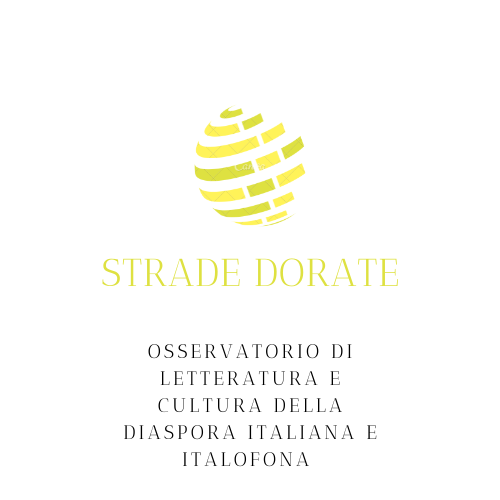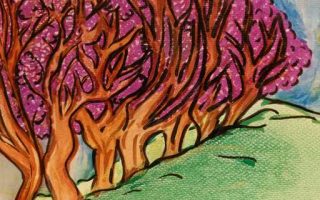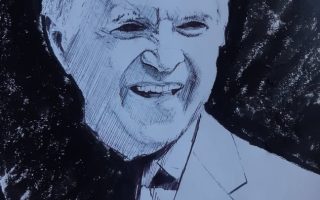by DOMENICA DIRAVIAM
The winding two lane roads of Northwest Arkansas lead through a town with a population of 4301 inhabitants. Many of these share a bloodline with the original 40 Italian families, who in 1895 followed a somewhat circuitous route from Italy, which was undergoing a massive economic and demographic revolution at that time, to southeast Arkansas where they suffered economic exploitation and disease before they ultimately settled upon the fertile soil of this area and founded an ethnic enclave known today as Tontitown. The locals are proud of their legacy and maintain ties to a cultural heritage that has been reimagined over time, shaped by unavoidable social and economic factors and technological advances that impact all communities big and small. Unlike the “Big” Little Italys of cities like New York, San Diego, and Toronto – tourist destinations in their own rite presided over by the ghosts of immigrants past, the residents of this farming community of lesser renown, remain steadfast in their commitment to preserving a distinct cultural legacy. Theirs narrative framed around grape stomping, pasta making, and bocce playing integrated with southern fried chicken and baseball diverges from the stereotypical images of the Italian American experience.
Members of the forty founding families from the Veneto region of Italy display their cherished artifacts, including farm equipment, handicrafts, letters, and photographs in the local museum, and safeguard their intangible legacy of oral histories through a grant funded oral history project. Their common objective and shared origin story are protected from the erosion of time, diverging interests of the younger generations, physical distance from their ancestral village, and the loss of the founding members. The cultural artifacts describe varying perspectives of decades of the traditional grape festivals, characterized by the commemorative judging of the grape, crowning of the queen, and grape stomping, attracting outsiders from neighboring towns with carnival rides that varied from a dunking booth and tests of strength. The residents hold a collective memory of a public elementary school education paradoxically led by Catholic nuns who required the students to participate in daily Mass at the start of each school day. Tontitown residents including Chris Ranalli recognize this as the community’s multipronged solution to avoid gentrification of the Italian families by bussing the Tontitown youth during those formative years, while simultaneously salvaging a school building that would have been vacant or demolished. And yet, they did assimilate into the American culture as they recall Halloween antics that included trick or treating for homemade treats at the surrounding four or five houses spread over the vast acreage of farms.
The published narratives of Tontitown’s residents are aglow with patriotism for the United States and ethnic pride in their unique brand of Italian Americana. What is notably lacking from the collections of memories are stories of repatriation to Italy. If they subscribed to the immigrant trope as so-called birds of passage, it was more commonly manifested in transferring to work in the mines, or to settle in a neighboring county or state, or to marry a resident of another town, and almost exclusively returning to set up a homestead in Tontitown. Nowadays, however, the narrative has shifted. Well known conglomerates played a role in Tontitown’s evolution. The grape famers who experienced ebbs and flows, during and following Prohibition, celebrated an economic renaissance while Welch’s relied on their crops for its production of preserves and juice. They were thrashed as the company pulled out of the area in the 1980s, and today there is but one remaining grape farmer in Tontitown; his name is Chris Ranalli. The Walmart headquarters, located in nearby Bentonville, offered employment opportunities to the offspring of the original families, but also disrupted the convivial mindset of the small town. Many young families commuted or relocated following the Walmart prospects and subsequently fell victim to layoffs, as was the case with Heather Ranalli Peachee, Chris Ranalli’s daughter. She returned to her roots, and immediately pivoted to working on her father’s farm and ultimately gave birth to her family’s dream of establishing the Tontitown Winery, returning the joy of being part of the Tontitown community to its epicenter.
Chris Ranalli and Heather Ranalli Peachee are the protagonists of the today’s Tontitown. In February 2024, seated on the comfy couches in the spacious room at the Tontitown Winery before the 11 AM morning rush, Chris and Heather delighted me with intergenerational stories of their past, present, future aspirations marked by their recent experience as a host family to an Italian exchange student and their first repatriation to Italy in the latter part of 2023. Chris Ranalli, born in 1959, shared memories of his ancestors and growing up in Tontitown, intermittently modified by Heather’s own memories and questions. The conversation segued into details about the growth of the winery and the community support that has made it a popular spot year-round for locals and outsiders. This claim was confirmed when, an hour into our conversation, a lively group of retirees entered the establishment and settled in for fellowship, game playing, and lunch. Our conversation carried on as Chris and Heather shared a deeply meaningful part of their ethnic and cultural journey, their role as a host family to an Italian exchange student, Fed, from northern Italy in 2023, the catalyst for the Ranalli repatriation to Italy, more specifically to Chris’s grandfather’s hometown of Orvinio, in the province of Rieti.
This is an excerpt of the conversation I had with Chris Ranalli and his daughter Heather Ranalli Peachee (born 1981) that highlights aspects of these two events and their effect on the family’s perceived ethnic identity.
~
Domenica Diraviam: Let’s transition to your life as an Italian American here, and once you hosted an Italian exchange student. Then you went to Italy. Tell me about having an Italian exchange student. How did that reform, if at all, your vision of what it means to be Italian or Italian American.
Heather Ranalli Peachee: It was kinda interesting how it worked out. We didn’t sign up to be a host family. He was placed in a house in our area and it didn’t work out, so he ended up within just a few days. He was in our son’s advisory, and he needed a home to come to and so he ended up pretty short notice in our house… It was another one of those [things that] just worked out perfectly. Once he got settled, we started talking to him, getting to know him better. He is from – you know all the Italians and Tontitown are mostly Northern Italians.
(Aside) An interesting thing, some years ago a co-worker of mine told me that my dad was not 100% Italian because he was 6′ 2″. You know, and she was like super Southern Italian.
[Fed] came, and we expected, whatever, we saw a picture of him we expected him to be this dark haired, short-ish, you know, and he’s like, 6′ 3″ or 6′ 4″, light haired, blue eyed, Italian. So that was really interesting, too!… His dad is from Parma, his mom is from Venice… It was kind of a fun little correlation with our family because he was more like what our people are like.
Domenica: It was outside of the stereotype?
Heather: Yeah, yeah, yeah. So he lived with us from October, until he left just this last June and it was one of the best decisions that our family made. On short notice we made our dining room into a bedroom because we just had 3 bedrooms. Quickly, he became a part of our family. We learned a lot from him. Especially as far as like cooking and things, he did like to cook the carbonara – which is not my favorite – but he liked to cook it often. And pesto, and things like that. Sometimes I do feel, though, like almost, like he appreciated that he came into an Italian community, his mom especially embraced [that] he was with a family that was more like them.
But sometimes, it’s really interesting, because sometimes Fed made – no, he didn’t “make me” – but just getting to know him almost made me feel less Italian. Do you know what I’m saying? because he was so… I mean he really is the real deal, and we have the blood, but we don’t have a lot of the traditions that he had. So that was pretty interesting.
Domenica: But if I may say, you have a unique set of traditions. For example, when I went into the restaurant, I saw that you have spaghetti with fried chicken. That’s a thing of here, a combination of the 2 cultures.
Chris: That is our signature here. And people say why? Why chicken and spaghetti? The reason why people eat chicken and spaghetti is because that is what we had. We had chickens and we could make our own pasta. You know we bought pasta machines. and made our own pasta throughout our whole life. We’ve never bought spaghetti from the store – ever – still don’t. Matter of fact we make, we have a small commercial pasta factory up here that we sell at our produce market. We sell homemade pasta… We have a bakery in there. We also do different types of bread and cookies and pasta. We make homemade biscotti.
Heather: Especially Fed’s mom, I think, gave us even more of a connection back with Italy. And I think just our connection with even his family. Before we met, before I knew him, his mom and I became best friends. It was good for our kids especially, just to kind of learn a little bit. First about, you know, like
loving others, and accepting everybody, and then also just a little bit more about our culture.
Domenica: Was the idea to have a trip to Italy already in your mind, or was it based on this?
Chris: No, actually… I always wanted to go.
Heather: Yeah, dad, we always said, we’re gonna take dad to Italy someday.
Chris: I just want to go see where my grandfather, where the Ranallis were from. We knew the area, the little community that he was from. But I kind of had this vision in my head – Where did he come from? How did they live over there, you know, I just wondered about it. I probably I really never thought I’d ever go, you know, but Heather made it happen, you know.
Heather: After Fed left, the Exchange, our representative lady, said something that she had learned through the years, that before they leave, have a plan, for when you’re going to see each other again. It makes him leaving a little easier. Well, at that time we didn’t really have a plan of when we were going to see him again, and he left. Our whole family literally cried for days, all 4 of us, because he’s – we’re all very quiet. He’s very loud and he gave a lot of energy and took a lot of energy, and he was fun and he brought us to life again. We bought a new house, and the house seemed huge once he was gone. It’s crazy. So we missed him more than we knew we would. And I started looking at plane tickets because I was like, we can’t – she was right! You know, like we need to know when we’re going to see him again. I started looking at plane tickets and during Thanksgiving. [when] school’s out. Airfare was reasonable. And so, Dad came to music event here one night. I pitched it to him. I was like, we want to go to Italy in November. Do you think you could go? And my stepmom, his wife – they’ve been married since I was 5 and I love her – her health isn’t good. So immediately, he was like, “I can’t do that. You know, because I can’t leave Les.” Anyway. within that same conversation we quickly brainstormed, who could we ask to help take care of her while he was gone? And we made it happen!
Chris: You made it happen, yes!
Heather: I’m so thankful that we did. We booked it maybe July or so, maybe August. And it came fast. That’s how we like to travel. I don’t want to think about it for 2 years. Everything just worked out perfect. Her health was good when we left and still is. We were able to go without Dad stressing out too much.
I had talked to Enrica Artemani. She’s also from Tontitown. She has the dual citizenship, and she spends half the year in Italy. She is really knowledgeable. And so whenever I was planning our trip, I talked to her about it. We looked at Orvinia, where Dad is from. We knew we wanted to spend time in Parma with Fed’s family. We wanted to go to Rome. I wanted to make sure Dad got to see the Vatican and stuff and then we wanted to go Orvinio. I wanted to go to Venice too. We had to cut that out, so we’ve got to go back. And so I talked to Enrica as I was planning in our trip. I was like, “Do you think we need just one or 2 days in Orivinio?” And she’s like, “Do you know, do you know people there?” No. We looked online. You can’t… They’re just, they are a little bit disconnected. Just a little bit. They are on Facebook now, now that we know them. We are friends with them. But I couldn’t find them.
So she suggested, “I think one whole day is going to be enough, I think 2, if you don’t know anybody, 2 is gonna be too much.” So that’s what we booked. I booked an Airbnb. In the little description, that asked what you’re there for, I explained, my great grandpa came from Orvinio. I’m the fourth generation of the Ranalli family. My great-grandfather came from Orvinio about 1907. You know, whatever. We’re just coming to check out where he came from. Well, our Airbnb owner called the day before, to know when we were gonna check in, and said – I thought that he probably couldn’t speak English, so I gave the phone to Fed’s mom. And he asked her, “What’s their family member’s name that left here?” So, she told him. And we told them what time we were gonna arrive the next day, and we’d take a train and take a hour to uber up the mountain. When we get to the top, this black car’s at the very top of the mountain at the edge of the city. He’s like waving us in, our Airbnb owner waited for us at the edge of town and showed us to our Airbnb. We get there. And he said, “There are other Ranallis here, and they’re closer than you think.”
Within less than 5 minutes we get a knock on the door, and it’s Andreina Ranalli who – like our front door is here, and her front door is -Right across! It was the craziest thing ever!
Chris: I mean, you walked 10 steps to be at her front door. Yeah, it was that close,
Heather: And her grandpa and Dad’s grandpa are brothers. It was crazy, and she didn’t speak any English. We speak no Italian. Thankfully, Maurizio, our Airbnb owner, speaks perfectly both. And oh, my gosh, it was the best! … She walks in, and she has 5 pictures in her hand, and 3 of them, 3 pictures are at Dad’s house that he still lives in today. Yeah, it was crazy. She said that whenever she was cleaning up her dad’s house, he passed away 2017, she was cleaning out his house, and she found these 5 pictures. Everybody knew – they called him Uncle Nazzareno. Everybody knew who he was and had wondered always. He wasn’t the forgotten uncle at all. He was the only one that [left]. And they all wondered. He was like a topic of conversation in their house. It was crazy!
So, she showed us these pictures and Dad’s like “That’s my house.” And that’s where Nazzareno lived, you know. That’s why I was trying to get it out. You know I’m still living in the house that Nazzareno built. Apparently, he had sent those pictures back over the years, and he had maybe – they said – sent some money randomly. And they wrote back and the letters stopped. So, at that point they didn’t know where, what happened to him.
Chris: I think Nazzareno died I believe [in] 1964 believe, or a pretty close, because I was born in 59, and I vaguely remember him being in the nursing home. He wasn’t still on the farm here, because he wasn’t well. And my dad was trying to raise 7 children by, you know, out there. So, my dad had him put in the nursing home after my mom died, I think, is what it was. See, my mom died when I was 2. My Dad was still taking care of his dad. And my grandfather Nazzareno had 7 kids.
Domenica: So you connected the dots from 1964 present?
Heather: It was so cool! Oh, my gosh! We never imagined this. We thought we were just gonna like, go there and see where he came from. We never imagined we would run into another – and we thought – we looked it up online. It said there were 12 Ranallis that still live in Orvinio. And so we knew there were some there. And we thought we can surely contact them. But we never imagined it would be like proper real like family, and they would know, our people. So, it was fantastic! And so she took us to. So, what happened was our Airbnb owner, his wife. went to City Hall, found out who still lived there that was related to Nazareno, and then contacted Andreina. Her brother, Severino doesn’t live in Orvinio anymore, but he still has the house there. And he took us to that house. And it was Nazzareno’s house that he lived in in Italy. They still own it.
Chris: They’re still own that, my grandfather’s house.
Heather: They showed that they let us in there, and we got to look around. It was like tiny, and they said 10 people lived in it, and it was tiny! One bedroom. The kitchen was like a little closet. I mean, this city is ancient, I mean I guess it was a city. So, all the Tontitown Italians are from northern Italy, but our family and the Morsani family came from just north of Rome, which is Orvinio. And it’s a beautiful place. Now we want to buy a little something there to be able to go back more often.
Chris: It just all came together, and everything just went just perfect! I mean, it couldn’t have been a better. a better experience of my life. And now I come home, and you come back over here, and you think. Gosh! I just want to go back. You know other little areas around there, little villages. They’re just dotted all over the countryside. It’s like you get up on the mountain, and you look out. There’s all these little villages. They’re just beautiful. I mean, you know. I can just imagine going to these places with my family. And they give me some more history. You know it’s just like whenever we got to Orvinio my cousin Andreina said her brother would be there here in a few minutes, and he shows up, and we walk down this street, and we there’s this big overlook. I mean, you can see out there. I mean these mountains that have looked like snow covered. But there wasn’t snow. It was just cloud, you know, low clouds on these mountaintops as far as you can see. I mean, it’s just beautiful, beautiful. And then you look in the valley down through there, and there’s these big, green, beautiful fields down there. And he told me, he said, that’s where my grandfather worked. He said that he was a farmer, and he said he had several donkeys or mules and he, you know had to have one rope tied to another one, and another one. Had what they called strings of work mules that would go down there and haul heavy loads of stuff down to the fields, and then at night they’d come back, and he said sometimes they would even stay down there. They had them a little cabin or, you know, a place that they’d stay down overnight. It was a long trek. Yeah, you know. It was a long ways across there. He said, Yeah, that’s where he was a farmer in Italy. Because you always want to know what they’d done in Italy because he was just a young man at the time. But he was definitely a farmer. And we did go to City Hall and got his birth certificate. Since then they sent us also his baptismal certificate.
~
As the lunch crowd filled the spacious dining area of the Tontitown winey with midday revelry, it was apparent that the Ranalli family fostered a community focused culture centered around the table, a modified version of the extended family that Nazzareno had left in Orvinio. As Heather and I made plans for future conversations, we ambled throughout the rooms of the winery a renovated mid-century home and I got acquainted with her forbearers displayed in photographs on all of the walls, alive in spirit through the stories that continue to be told. And in my refrigerator there is a chilled bottle of Tontitown’s muscadine wine waiting to be uncorked when Heather and I enjoy her photos and videos of their 2023 trip to Italy.




